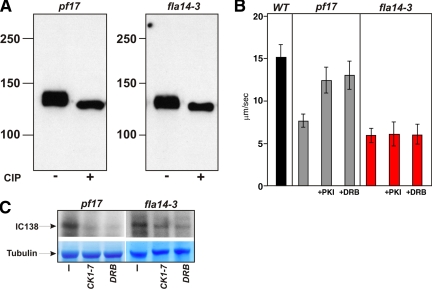Figure 5.
IC97 is required for regulation of microtubule sliding. (A) Western blots of isolated axonemes from pf17 and fla14-3 were probed with an antibody to the IC138 I1-dynein subunit. Axonemes were untreated or treated with CIP. IC138 is extensively phosphorylated (hyperphosphorylated) in radial spoke mutants such as pf17 and in the fla14-3 mutant (compare the untreated vs. treated bands; Hendrickson et al., 2004). (B) Microtubule sliding velocities were measured in wild-type, pf17, and fla14-3 axonemes (bars indicate means + SD). Sliding rates were reduced in fla14-3 axonemes relative to wild type—a result consistent with other radial spoke mutant axonemes (pf17). In contrast to pf17 axonemes, the sliding rates of fla14-3 axonemes do not increase upon addition of the kinase inhibitors protein kinase inhibitor (PKI) or DRB indicating that IC97 is required for PKI/DRB-mediated rescue of microtubule sliding. (C) In vitro phosphorylation of pf17 or fla14-3 axonemes by using [γ-32P]ATP was performed in the presence or absence of CK1-specific inhibitors. In pf17 and fla14-3 axonemes, when axonemes are pretreated with kinase inhibitors (CKI-7 or DRB), radioactive phosphate incorporation into IC138 is reduced, indicating that IC138 is largely dephosphorylated.

